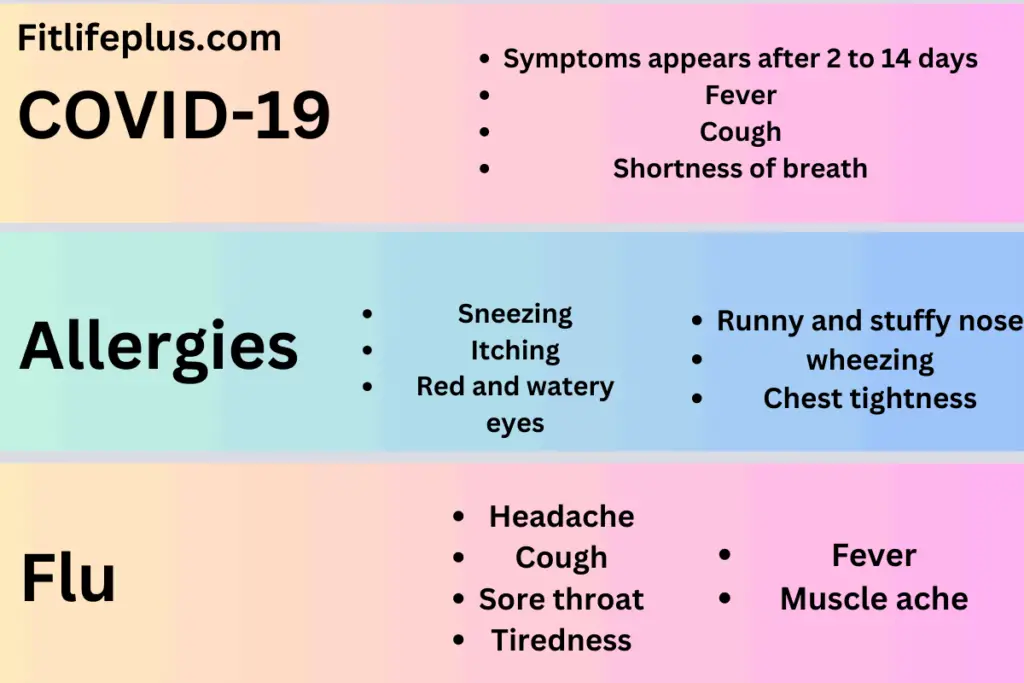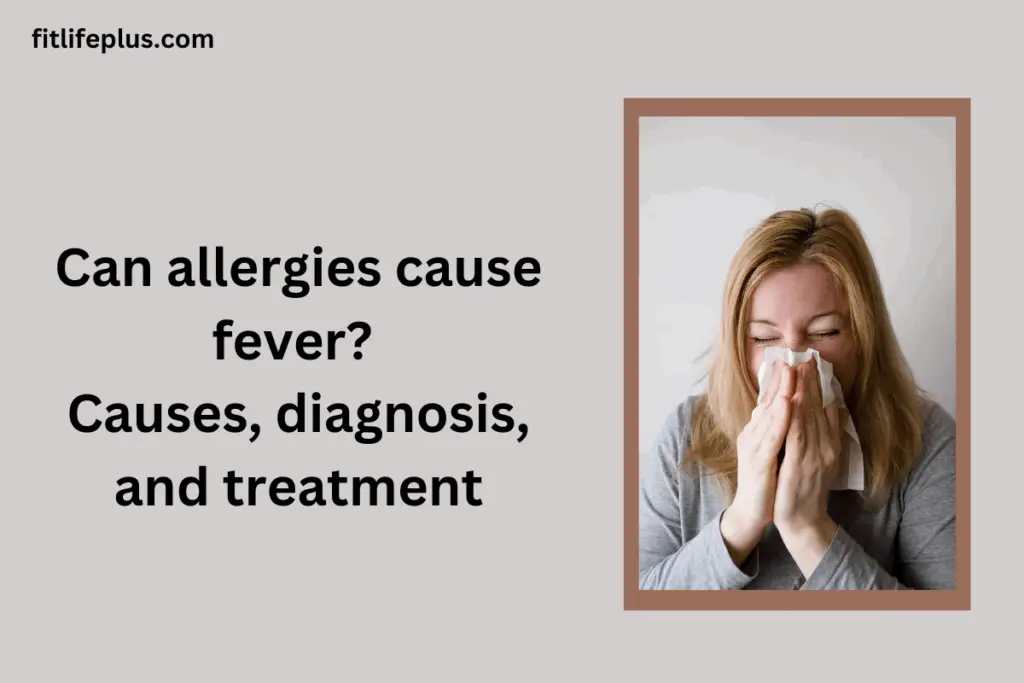During the weather change, people usually become prone to bad weather. If you also suffer from allergies, you must observe if your nose is stuffy because of the air’s pollens or the bacteria in the blood.
So, Can allergies cause fever?
In simple words, allergies don’t directly cause a fever. When the body temperature gets high during allergies, our body fights the viral infection. Sometimes, the allergies result in other conditions like sinus infection that result in favor.
Let’s dig into the details of the question can allergies cause fever:
Can Allergies cause fever?
According to the American College of Allergy, Immunology, and Asthma, allergies don’t result in a fever. However, an allergic reaction can trigger a sinus infection, resulting in a fever.
When the body gets close to any allergen, our body’s immune system starts releasing chemicals to protect it from them. The main chemical histamine is the main reason behind seasonal allergy symptoms.
The common allergy symptoms include:
- Dust mites
- Tree pollen
- Ragweed
- Grass pollen
- Mold
- Animal dander
Suppose you are experiencing the allergy symptoms like itchiness in your eyes and runny nose with some allergy symptoms like fever. In that case, it must be due to the chronic congestion that results in a sinus infection. People suffering from rhinitis are generally more prone to chronic sinus infections that can trigger a fever.
Common allergy symptoms
Here are some common symptoms that show you suffer from seasonal allergic rhinitis. These symptoms also depend on the specific allergens and your body’s sensitivity. Here are some of the common symptoms you must look for:
- Itchiness in eyes, throat, and nose
- Coughing
- Congestion
- Headaches due to sinus pressure
- Sneezing
- Postnasal drop
- Sore throat
- Difficulty in breathing
- Fatigue
- Wheezing
Seasonal allergies are not the only reason for such reactions. Food allergies can cause pressure on these symptoms, make you nauseous, and upset your stomach. Skin allergies and hives are also indicators of allergic reactions.
Are you sure these are the allergy symptoms?
Even when you don’t have a favorite, you should take good care of your body. When you ignore the allergies, it can cause severe conditions like asthma and sinus infection with time. If you try self-medicating and ignoring the symptoms, in some cases, you can end up doing more harm to yourself than good.
Watch for bad breath, green or yellow mucus, or other symptoms like hot flashes and chills. At the start, it can be as minor as a sniffle, but if you don’t consult a healthcare provider, it can result in more serious conditions down the line.
Causes of allergy symptoms and fever
Many viral infections can make you suffer, like allergy symptoms and fever. The main symptom that shows if a person has an allergy is that they will experience these symptoms only when they come in contact with the allergens. While viral infections like the common cold or flu last longer than expected.
Allergies can also result in itchy and watery eyes. This symptom doesn’t appear with the flu or cold.

Flu
Flu has similar symptoms that we experience with allergies as both conditions impact the respiratory system. It can result in a fever that lasts for 3 to 4 days. Some other flu symptoms include:
- Cough
- Headache
- Runny or blocked nose
- Fatigue
- Sore throat
- Chest congestion
- Pain
- Body ache
Itchy and watery eyes are a common symptom of allergies compared to the flu.
Sinusitis
Sinnitus is a swelling in the person’s sinuses. These are the hollow cavities in the face and around the cheeks, eyes, and nose. The mucus present in the sinuses allows airflow. However, if the sinus becomes swollen, the mucous may not be able to drain correctly, and this will result in the build-up.
Sinusitis typically occurs after an infection like the flu or the common cold. In the case of acute sinusitis, a person can develop:
- Cough
- Pain in the cheeks and forehead
- Congestion
- Toothache
- Thick yellow and green discharge from the nose
- Postnasal drip
COVID 19
COVID-19 is a viral illness like a common cold. Different people’s bodies react to COVID-19 in many ways. Chills and fever are the general symptoms of COVID-19:
- Diarrhea
- Congestion
- Cough
- Fatigue
- Sore throat
- Loss of smell and taste
- Difficulty in breathing
- Vomiting
- Nausea
- Pain in Muscles
Diagnosis
You can consult an ENT specialist to determine if your symptoms are allergies. After taking the appointment, follow the following steps to get the most out of the visit:
Keep an eye on the symptoms
When your symptoms appear, get serious, or dissappears, note them down. If you have seasonal allergies, take note of these symptoms, as they will help your doctor diagnose.
Give the doctor details of your medical history.
A complete and detailed medical history helps the doctor to find the possible connection between your allergens and symptoms.
Do an allergy test.
Allergy tests are the best way to isolate the leading causes of your symptoms. Generally, the allergy specialist will do a scratch test to observe your body’s reaction to multiple allergens. In other cases, they may recommend you to do a blood test, skin patch, and intradermal test.
Also read: Why do my allergies get worse at night?
How to treat allergy with a fever?
Generally, allergies are not the leading cause of your fever. If you are experiencing a fever with an allergy, there might be another cause to blame. Let your doctor know about all the problematic symptoms you are experiencing. You may need antibiotics to treat the root cause of the fever.
In many cases, you first must treat the bacterial infection before the allergies. But in other cases that involve some other illness, you may need to treat your viral infection first. Give your doctor your medical history so the medicines don’t react together.
The allergy treatment involves the following steps:
- Avoiding allergens
- When the symptoms are severe, you may need to take the allergy shots
- Using nasal spray, decongestants, and antihistamines
Lifestyle changes
Changing your lifestyle and routine could reduce your exposure to allergens. You can also minimize the allergy symptoms by trying out the following tips:
- Use neti pot or nasal sprays
- Regularly vacuum and dust
- Purify the air in your house
- Take the natural supplement, for example, the vitamin C and peppermint oil.
FAQ’s
Is allergy the cause of low-grade fever?
Seasonal allergies don’t cause any fever. But the further infections that result from the allergies, like the sinus infection, can result in a fever.
What are the symptoms of hay fever?
Here are a few common symptoms of hay fever:
- Cough
- Sneezing
- Watery, itchy, and red eyes
- Runny nose
- The itchy roof of the mouth, throat, and nose
- Swollen and bruised appearing on the skin, especially under the eyes
How long did the Hay fever last?
Hay fever can last weeks to months, unlike other allergies and colds that go away within 1-2 weeks.
When is the allergy season?
In most United States Areas, the spring, the allergy season, begins in February and lasts till the early summer season. During this season in the earlier year, the spring pollination starts, followed by the grass pollination in the spring and summer and the ragweed in the late summer and fall.
Conclusion
In short, allergies don’t cause a fever, but you can have a favor with allergies due to other causes. If you have been suffering from allergies, don’t ignore them. Make an appointment with your ENT specialist to discuss your condition and its possible treatment.
The longer you delay them, the worse they can get. So try taking care of your body.




